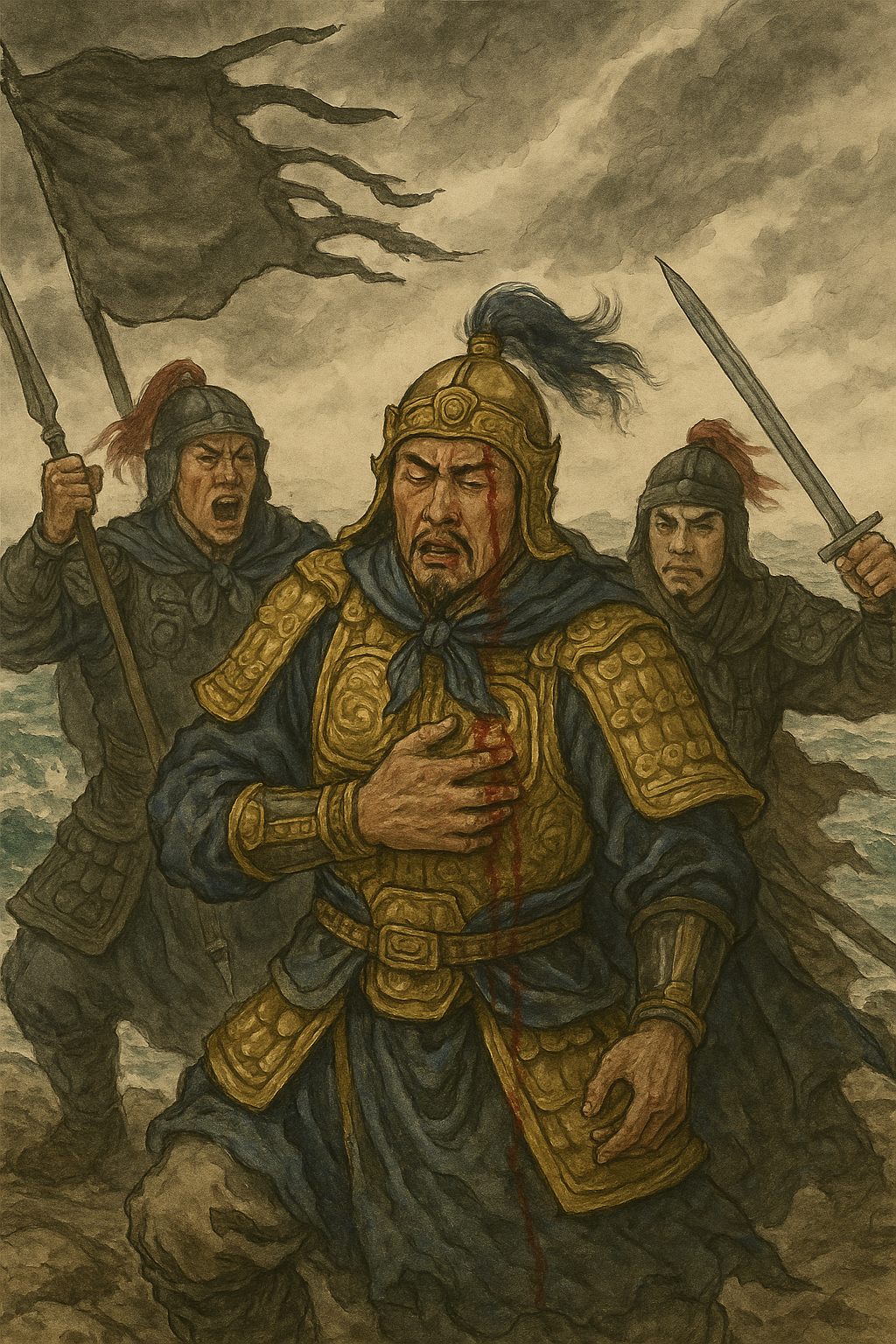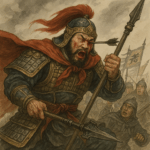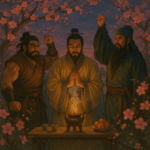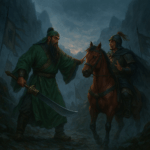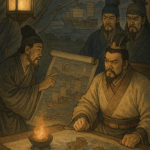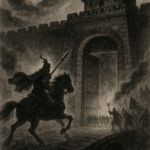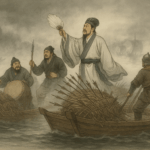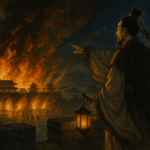Pang Tong was startled by Xu Shu’s words and quickly looked to see who stood before him—it was his old friend Xu Shu. Recognizing him, Pang Tong’s heart steadied. He glanced around and saw no one near, so he said quietly, “If you reveal my plan, you will condemn the eighty-one prefectures south of the Yangtze and their hundreds of thousands of people to ruin!” Xu Shu smiled and replied, “But what of the eight hundred and thirty thousand soldiers on this side—what of their lives?” Pang Tong asked, “Yuanzhi (Xu Shu), do you truly intend to thwart my strategy?” Xu Shu answered, “I have not forgotten the great kindness of Liu Bei. When Cao Cao sent my mother to her death, I vowed never to strategize again; how could I now betray your brilliant scheme? Yet I serve under his banner here; if our forces fail, I shall perish along with the rest. Teach me how to escape, and I will keep your secret and slip away.” Pang Tong smiled and said, “With your lofty insight, surely it is no hard task.” Xu Shu asked, “I beg you to instruct me.” Pang Tong leaned close to Xu Shu’s ear and spoke a few brief sentences. Xu Shu’s face brightened with joy; he clasped Pang Tong’s hands and thanked him. Pang Tong then bade Xu Shu farewell, boarded his boat, and returned to Eastern Wu.
That same evening, Xu Shu secretly dispatched trusted men to spread rumors in each camp. The next day, small groups of soldiers gathered in clusters, talking in whispers. Scouts quickly reported to Cao Cao: “There is word in the camp that Han Sui and Ma Teng in Liang Province have rebelled and are marching upon Xuchang.” Alarmed, Cao Cao summoned his strategists: “I led my army south, and my chief concern has been Han Sui and Ma Teng. Though this rumor may be baseless, we must not be caught unprepared.” Before he could finish, Xu Shu stepped forward and said, “I have enjoyed the Chancellor’s favor and lament that I have no opportunity to serve. Grant me three thousand soldiers, and I will ride through San Pass and seize the mountain passes. If any emergency arises, I will send word.” Cao Cao exclaimed, “If Yuanzhi (Xu Shu) goes, I shall have no further worries! There are troops at San Pass already—General Pang may command them. Here and now, assign three thousand cavalry and infantry to him; let Zang Ba lead the vanguard and march through the night without delay.” Xu Shu saluted and, accompanied by Zang Ba, set off at once. Such was Pang Tong’s plan to rescue Xu Shu. Later poets would lament:
“Cao Cao vexed by the southern campaign each day,
Han Sui and Ma Teng raise their spears to betray.
Pang Tong’s words save Xu Shu from the snare—
As fish slip the hook, they escape with flair.”
Once Xu Shu was dispatched, Cao Cao’s mind eased somewhat. He mounted his horse and first inspected the riverine land camps along the Yangtze, then the water camps. He boarded a large flagship amid the fleet, its central mast bearing a banner inscribed with the character “Commander.” On either side stretched an array of river camps, and hidden among the flagship’s deck were a thousand bowmen and crossbowmen. Cao Cao took his place on the upper deck. It was the fifteenth day of the eleventh month in the thirteenth year of Jian’an (December 14, 208), a clear, windless winter’s day. Cao Cao declared, “Set out wine and music on the flagship; tonight I wish to host the generals.” As evening fell, a silver moon rose over the eastern hills, bright as day, and the Yangtze lay calm like a white ribbon. Cao Cao sat in splendor upon the flagship, flanked by hundreds of attendants in embroidered robes, halberds and spears in hand. The civil and military officers each took their assigned seats.
Surveying the scene—Southward, Pine Screen Hill painted a living landscape; eastward, the borders of Chaisang Commandery stretched into view; westward, Xiakou’s river currents could be seen; to the south rose Mount Fan, and to the north, Wulin’s dark forest. All around stretched boundless expanse. Cao Cao’s heart swelled with joy as he turned to his officers and proclaimed, “Since I began the uprising, I have purged evils for the realm, sworn to sweep clean the Four Corners and unify the land. Only the south of the Yangtze eludes me. Now I have a million-strong army and the support of you, my officers—how can we fail? Once we subdue the south, the world shall be at peace. Then, let us share riches and honor, enjoying the new age of peace together!” The civil and military officials rose in unison, thanking him: “May we soon sound the victory drums! We owe our lives to the Chancellor’s grace.” Cao Cao beamed, and ordered the attendants to serve wine. As midnight approached and Cao Cao grew merry, he pointed to the distant south bank and said, “Zhou Yu and Lu Su do not know the time or their fortunes! How fortunate we are that traitors come to us—this is Heaven’s aid.” Xun You cautioned, “My lord, do not speak thus—lest we leak our plan.” Cao Cao laughed heartily: “All here are my most trusted confidants—what matters words among us?” Then, pointing to Xiakou, he said, “Liu Bei and Zhuge Liang—did you think to move mountains with the strength of ants? How foolish!” Turning to his generals, he said, “I am fifty-four this year; when we take the south, I shall be overjoyed. In days past, I coveted the two beauties of Qiao’s household, for I knew they possessed imperial grace. Now Zhou Yu and Sun Ce’s wives hold them. I have newly built the Bronze Sparrow Terrace on the Zhang River; if I conquer the south, I shall marry the two Qiao sisters, set them on the Terrace, and enjoy my old age in contentment!” With that, he laughed aloud. The Tang poet Du Mu later wrote:
“Broken halberds sink in sand, yet steel knows not decay:
I bring them forth to study the realms of yesterday.
If East Wind fails to aid young Zhou Yu’s might,
At the Bronze Sparrow Terrace, the Qiao sisters lament their plight.”
As Cao Cao laughed and conversed, a flock of crows cawed loudly, flying southward. He asked, “Why do the crows cry by night?” An attendant answered, “They see the bright moon and think dawn has come—hence their cries as they leave the trees.” Cao Cao laughed again. Now half-drunk, he seized his spear and stood at the bow of the ship. Lifting a cup of wine, he poured libations into the river, drained three bowls, and brandished his spear, addressing the generals: “With this spear, I drove back the Yellow Turbans, captured Lü Bu, destroyed Yuan Shu, subdued Yuan Shao, pressed into the northern frontiers, and crossed to Liaodong—with my hopes fulfilled, I have not lived in vain as a true man. Now, standing before this scene, I am filled with heroic ardor. I shall compose a song; you all shall sing its refrain.” He began:
“Facing wine, I must sing—how brief our life!
Like morning dew, the days we lose pass by in strife.
With a heart so bold, I cannot be content—
Joy dies hard, worry clings, and no relief is sent.
What, then, can ease my grief? Only strong Du Kang’s brew.
My dearest friend, though miles apart, still I long for you.
As the deer cry in the wild, for their prey they press,
We welcome honored guests with strings and pipes to bless.
The moon shines on, so fair—when, say, shall it cease?
My care wells up within me, a sorrow without peace.
Across towns and fields we roam, yet goodwill remains—
Our banquets of old, our deep affection, still sustains.
The moon drifts, stars grow dim, the crow flies southward by—
Round trees, it circles thrice, with no perch to rely.
Hills never tire of heights, rivers never fear the deep;
Like Zhou Gong, welcoming gifted men, all hearts shall to me keep.”
When he finished, the generals joined in the refrain and all laughed together. Suddenly, an officer rose and said, “At a time when our armies are arrayed for battle and our soldiers await orders, why does the Chancellor speak such inauspicious words?” Cao Cao turned and saw whom the officer meant: the Inspector of Yang Province, Liu Fu of Pei State, courtesy name Yuanying. Liu Fu had risen from the Battle of Fei River to establish Yang Province’s administration—gathering refugees, founding schools, reclaiming fields, and reviving education. He had long served under Cao Cao and achieved many merits. Now Cao Cao’s spear in hand, asked, “What words of mine were inauspicious?” Liu Fu said, “ ‘The moon grows faint and the stars scarce, the crow flies south; round trees it circles thrice, with no branch to rest upon’—these are ominous portents.” Cao Cao was furious: “How dare you undermine my resolve!” He raised his spear and drove it into Liu Fu’s chest, killing him instantly. The assembled officers were aghast. The banquet was abruptly halted. The next day, when Cao Cao sobered, he was filled with remorse. Liu Fu’s son, Liu Xi, came to request his father’s body for burial. Cao Cao wept and said, “Last night in my drunkenness I grievously wronged your father—my regret is beyond words. Offer him the honors due a Three Excellencies.” He then assigned troops to escort the funeral to its resting place and returned to oversee the rites.
On the following day, the naval commanders Mao Jie and Yu Jin came to Cao Cao’s tent and reported, “The large and small vessels have been fastened together in chains and are ready. The banners and wargear are complete. Your Excellency may order our advance at any time.” Cao Cao took his seat atop the flagship amid the fleet’s great battle junks, summoned the generals, and issued his orders. Both his naval and land forces were arrayed under five banners: at the center of the water army flew the yellow banner of Mao Jie and Yu Jin; the vanguard under a red banner was commanded by Zhang He; the rearguard under a black banner by Lü Qian; the left wing under a blue banner by Wen Ping; and the right wing under a white banner by Lü Tong. On land, the vanguard flew a red banner under Xu Huang; the rearguard under a black banner by Li Dian; the left wing under a blue banner by Yue Jin; and the right wing under a white banner by Xiahou Yuan. Across both land and water, liaisons Cao Hong and Xiahou Dun would coordinate the assault. The escort detachments to guard communications were commanded by Xu Chu and Zhang Liao. All of Cao Cao’s elite warriors were assigned to their respective units. Once the orders were given, the naval camps sounded drums three times, and each squadron of battle junks set forth in orderly formation across the river. On that day, a fierce northwest wind rose, filling the sails and propelling the ships swiftly over the currents, as if they moved on dry land. Standing atop his command platform, Cao Cao watched his forces drill, his heart buoyed by the conviction of victory: he ordered the sails furled and the canopies lowered, that all vessels return to their assigned positions.
Then Cao Cao rose to address his strategists: “If not for Heaven’s assistance, how could I have Yuan Yu’s (Pang Tong’s) brilliant plan? The chained ships truly traverse the river as though on level ground.” Cheng Yu rose and said, “Though the ships remain steady when linked, if the enemy launches a fire attack, we cannot evade it. We must not be complacent.” Cao Cao laughed and said, “Though Chuzhong (Cheng Yu) discerns dangers afar, he sometimes fails to see what lies close at hand.” Xun You rose: “Chuzhong’s words are well spoken. Chancellor, why do you laugh at him?” Cao Cao replied, “To use fire, one must have the wind in one’s favor. Now, in this dead of winter, how can east or south winds blow? I stand to the northwest of them, and their troops are on the southern bank—if they use fire, they will burn their own ships. What have I to fear? Had this been the mild tenth month, I would already have prepared defenses against fire.” All the generals knelt, saying, “Chancellor’s insight goes beyond ours.” Cao Cao turned to them: “The soldiers from Qingzhou, Xuzhou, Yanzhou, and Daizhou are not accustomed to riverine warfare. Without this stratagem, how could we cross such a great river?”
At that moment, two officers stepped forward and said, “Although we hail from Youzhou and Yanzhou, regions far north, we are capable of navigating ships. We ask for twenty patrol boats and pledge to advance to the river’s mouth, seize the enemy’s flags and drums, and return to demonstrate that the northern army can sail as well.” Cao Cao looked at them and saw they were none other than two former officers under Yuan Shao, Jiao Chu and Zhang Nan. He cautioned, “You were both born and raised in the north; crossing these waters will not be easy. The soldiers of Jiangdong know how to move on the river—we have no such experience. Do not risk your lives heedlessly.” Jiao Chu and Zhang Nan shouted, “If we fail, we willingly accept the army’s punishment!” Cao Cao said, “All your warships have been chained. Only small boats remain. Each can hold twenty men; I fear they cannot withstand real battle.” Jiao Chu replied, “What bravado do big boats have? We ask for twenty small boats; Zhang Nan and I will each command ten vessels. This very day we will dash into the southern river camp, capture their banners, behead their officers, and return.” Cao Cao said, “Very well. I entrust you with twenty small boats and five hundred elite troops, all armed with long spears and heavy crossbows. At dawn, when you appear, I shall send the great flagged ships into the river to support you. Meanwhile, Wen Ping will command thirty patrol boats to assist your return.” Jiao Chu and Zhang Nan returned, their hearts filled with excitement.
At the fourth watch the next morning, as the troops prepared their first meal, the drums and trumpets of the water camp sounded. The chained junks emerged from their encampments, spreading out across the river. The Yangtze gleamed with interlaced banners of blue and red. Jiao Chu and Zhang Nan led their twenty small patrol boats out through the camp, heading for the southern shore. On the southern bank, Wu’s soldiers—having heard the drums during the night—climbed the hills to watch. They saw Cao Cao’s forces withdrawing their ships and reported immediately to Zhou Yu. Zhou Yu rode to the summit. When he saw that Cao Cao’s fleet had returned to the camp, he felt reassured. But the following morning, the drums sounded again with greater urgency. The soldiers scrambled to higher ground and saw small patrol boats rushing northward. Word was sent to the central tent. Zhou Yu asked, “Who dares move first?” Han Dang and Zhou Tai stepped forward together and said, “We shall bear the vanguard and break their advance.” Zhou Yu smiled and relayed orders: “Secure all camps tightly—none must sally forth lightly.” Han Dang and Zhou Tai each took five patrol boats and led them forth.
Jiao Chu and Zhang Nan, relying on their courage, lashed their small boats ahead. Han Dang, wearing his breastplate,stood at his bow with his long spear ready. Jiao Chu’s boat reached first. He signaled his men to fire arrows at Han Dang’s vessel. Using shields to deflect the missiles, Han Dang opened his shielded cover and thrust his spear, piercing Jiao Chu through the heart and killing him instantly. Zhang Nan cried out in fury as he rushed forward. At that moment, Zhou Tai’s boat appeared through a narrow channel. Zhang Nan grimly held his spear aloft and sent his archers and crossbowmen into a frenzy. Zhou Tai drew his shield with one arm and brandished his sword with the other, his boat mere seven or eight feet from Zhang Nan’s. With a mighty leap, Zhou Tai vaulted onto Zhang Nan’s vessel, then raised his sword and struck, slaying Zhang Nan and many of his men as they fled. Han Dang and Zhou Tai quickly turned their boats to pursue. By midstream, they encountered Wen Ping’s patrol boats coming out to support them, and the two sides engaged in fierce fighting.
Meanwhile, Zhou Yu had mounted the peak with his other generals, watching Cao Cao’s great fleet arrayed upon the river in orderly ranks, their banners fluttering. He turned to see Wen Ping locked in combat with Han Dang and Zhou Tai. Han Dang and Zhou Tai fought ferociously; Wen Ping, unable to match them, retreated. Han Dang and Zhou Tai pressed the pursuit, and Zhou Yu—fearing they would be drawn too deep into enemy waters—raised a white flag and sounded the signal to recall them. They turned and raced back. Zhou Yu watched from the peak as the Northern ships sailed back into their encampment. He turned to his officers and said, “The Northern fleet lies as thick as reeds across the river, and Cao Cao is cunning—by what stratagem shall we break them?” Before anyone could answer, they saw a gust of wind catch the central yellow banner in Cao Cao’s camp—tear it from its staff—and carry it drifting into the river. Zhou Yu laughed loudly: “This is a most inauspicious omen for them!” Just then, a sudden gale rose, whipping the waters into foaming waves that slammed against the shore. A swift gust snatched a corner of the drifting banner and brushed it across Zhou Yu’s face. He suddenly recalled a crucial realization, let out a loud cry, and collapsed backwards, blood streaming from his mouth. His officers rushed to his side, but he had already lost consciousness. Truly:
One moment he laughed, the next he cried—
Never could we hope to best the Wei by pride.
What became of Zhou Yu’s life? That is a tale for the next chapter.
